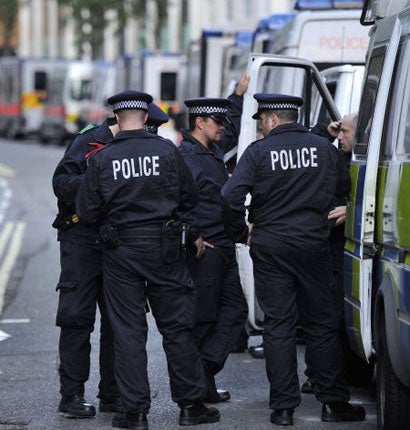John Rentoul: There is still a case for police cuts
David Cameron is very brave, or very foolish, to take on the police, but the argument for reform remains strong


David Cameron's decisions to return from holiday and to recall Parliament were gestures to appease the hysterical British press. But that does not mean they were wrong.
True, the Prime Minister's measures were thin, as such things rushed off the Home Office's emergency contingencies shelf usually are. The police already have the power to require the removal of face coverings: Cameron proposes a minor change in definition. The rest of his proposals were trivial, counter-productive or a propaganda gift to foreign tyrants. Or, in the case of a clampdown on Twitter or BlackBerry Messenger (whatever that is), all three.
And yet the assembling of our elected representatives served a purpose. It allowed the arguments for even more foolish courses of action to be aired and put aside. There was surprisingly little support for troops on the streets, or for "water guns and plastic guns", as John Prescott called them on that other essential part of our constitution, BBC Question Time, later that night. As for the causes of things, only one Tory (Edward Leigh) blamed the end of the married couples' tax allowance, and few Labour MPs, at the opposite extreme, put the looting down to "the cuts". Even BBC Pitchfork Time was constructive. When audience members wanted to take benefits or social housing from rioters, others pointed out that this might lead to more crime and make matters worse.
The real importance of recalling Parliament, however, was that it allowed the Opposition to attack and the Prime Minister to defend the planned cut in police budgets. That is the main issue of public policy arising from the disorder, and it was right and democratic that Cameron should have subjected himself to two hours and 45 minutes of questioning on it.
This is the fulcrum on which the calculation of political advantage rests. Cameron's gamble is that everyone knows that the police are overstaffed or overpaid by at least 20 per cent, and that their complicity with the underworld of journalism exposed by the phone-hacking scandal will further undermine public sympathy for their bosses. As Sir Humphrey might murmur: "Very brave, Prime Minister."
Cameron did not help his case with his dishonest defence of a "6 per cent cut in cash budgets", when the meaningful measure is the 20 per cent cut that takes inflation into account. Yet the case for police reform is strong. Spending on the police has risen by a huge 50 per cent (taking inflation into account) since 1997, and although the notorious overtime and "off work on full pay with a bad back" have been curbed, there is a lot more to do to secure good value for money.
One possible mechanism for making that change happen – the Tory plan for elected police commissioners – is in limbo between the Commons and the Lords, a dispute to be resolved in the overflow session next month. Yet this is not a rational debate about efficient working practices or innovative public order policing. In a rational world, Ed Miliband might be trapped by advocating higher public spending and an irresponsible policy towards the deficit. In the media world, though, the Labour leader is on "pro-police" safe ground, while the Prime Minister risks offending several core constituencies at once.
This is complicated by the sub-politics of the Metropolitan Police. Sir Hugh Orde, who would like to be Commissioner, saw his chance to assert himself. Boris Johnson, who might like to appoint him, and who certainly wants to be re-elected as mayor, saw his chance to oppose the cuts in police spending.
On the other side of the balance, though, is one analysis in The Economist, that disorder tends to strengthen the right, and that the Prime Minister looked comfortable last week as a traditional Conservative speaking sternly of responsibility: "Deep down, this is who Mr Cameron really is." Whether that will be enough to carry through the Blairite public service reform of the police, from which Tony Blair himself shied, is a question on which I should like to hedge my bets.
The result that emerges from the calculus of political advantage with more certainty is that the Liberal Democrats halved their distance towards zero yet again. Last week Nick Clegg was supposed to be in charge. He started by telling "the youngsters" that they "shouldn't do it again". So he should have been glad to be forgotten when Cameron returned on Tuesday morning to take credit for the police finally getting their tactics right.
The Prime Minister's dominance of the Commons in its emergency session – followed by Conservatives George Osborne and Theresa May – also eclipsed the coalition's junior partner. Nor did the policy response to the looting help the Lib Dems' civil liberties cause. Cameron was a wrathful, authoritarian father-figure last week, happy to fix a CCTV camera to the window of every soul and to deny his party's flirtation with Shami Chakrabarti as the cock crowed.
The only other certainty is that "the cuts" have, still, hardly begun. This could become a lot more difficult and, if the world economy slows down, it could be that the second part of Thursday's recalled session, in which George Osborne faced Ed Balls, to no great effect on either side, may turn out to have been the big parliamentary event of the week.

Join our commenting forum
Join thought-provoking conversations, follow other Independent readers and see their replies